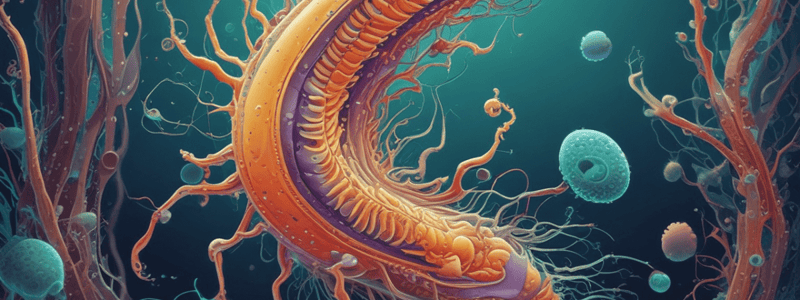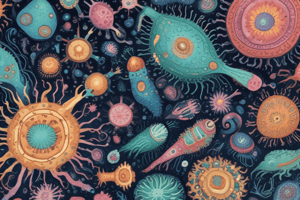Podcast
Questions and Answers
What is the characteristic of protozoa that allows them to perform whole life functions?
What is the characteristic of protozoa that allows them to perform whole life functions?
- They have a simple life cycle
- They are unable to move
- They are multicellular
- They are eukaryotic (correct)
What is the mode of reproduction in which the nucleus undergoes multiple divisions before the cell divides?
What is the mode of reproduction in which the nucleus undergoes multiple divisions before the cell divides?
- Conjugation
- Schizogony (correct)
- Binary fission
- Gametogony
What is the term for the process of production and fusion of gametes in protozoa?
What is the term for the process of production and fusion of gametes in protozoa?
- Conjugation
- Schizogony
- Binary fission
- Gametogony (correct)
Which of the following is NOT a type of motility found in protozoa?
Which of the following is NOT a type of motility found in protozoa?
Which classification of protozoa includes Entamoeba histolytica?
Which classification of protozoa includes Entamoeba histolytica?
What is the stage of Entamoeba histolytica that has an ameboid appearance due to the presence of pseudopodia?
What is the stage of Entamoeba histolytica that has an ameboid appearance due to the presence of pseudopodia?
How is Entamoeba histolytica typically transmitted to humans?
How is Entamoeba histolytica typically transmitted to humans?
What is the disease caused by Entamoeba histolytica in the liver?
What is the disease caused by Entamoeba histolytica in the liver?
Which of the following is an example of a Ciliate protozoa?
Which of the following is an example of a Ciliate protozoa?
What is the term for the fusion of genetic material between different mating types in Ciliophora?
What is the term for the fusion of genetic material between different mating types in Ciliophora?
What is the characteristic of the trophozoite of Entamoeba histolytica?
What is the characteristic of the trophozoite of Entamoeba histolytica?
What is the treatment for intestinal amebiasis?
What is the treatment for intestinal amebiasis?
What is the characteristic of the cyst of Giardia lamblia?
What is the characteristic of the cyst of Giardia lamblia?
What is the treatment for trichomoniasis?
What is the treatment for trichomoniasis?
What is the disease caused by Plasmodium falciparum?
What is the disease caused by Plasmodium falciparum?
What is the vector for Trypanosoma cruzi?
What is the vector for Trypanosoma cruzi?
What is the characteristic of the life cycle of Leishmania?
What is the characteristic of the life cycle of Leishmania?
What is the characteristic of the Trematodes?
What is the characteristic of the Trematodes?
What is the characteristic of Schistosoma haematobium?
What is the characteristic of Schistosoma haematobium?
What is the characteristic of the digestive system of Nematodes?
What is the characteristic of the digestive system of Nematodes?
Which parasite is responsible for urinary schistosomiasis?
Which parasite is responsible for urinary schistosomiasis?
What is the mode of infection for Taenia saginata?
What is the mode of infection for Taenia saginata?
What is the most common symptom of pinworm infection?
What is the most common symptom of pinworm infection?
Which of the following parasites causes ascariasis?
Which of the following parasites causes ascariasis?
What is the infective stage of Wuchereria bancrofti?
What is the infective stage of Wuchereria bancrofti?
What is the name of the disease caused by Wuchereria bancrofti?
What is the name of the disease caused by Wuchereria bancrofti?
What is the mode of infection for Hymenolepis nana?
What is the mode of infection for Hymenolepis nana?
What is the clinical finding in heavy infections of Ascaris lumbricoides?
What is the clinical finding in heavy infections of Ascaris lumbricoides?
What is the definitive host for Taenia saginata?
What is the definitive host for Taenia saginata?
What is the infective stage of Enterobius vermicularis?
What is the infective stage of Enterobius vermicularis?
Study Notes
Helminths
- Haematobium: found in venous plexus of bladder, ureter, and kidneys; causes urinary schistosomiasis; eggs pass in urine
- Taenia saginata (beef tapeworm): causes taeniasis saginata
- Morphology: scolex, segmented with 1000-2000 segments
- Life cycle: human as definitive host, cattle as intermediate host; infective stage: cysticercus bovis; mode of infection: ingestion of raw or improperly cooked beef
- Hymenolepis nana (Dwarf tapeworm): causes hymenolepiasis nana
- Life cycle: adult worms in small intestine; definitive hosts: human, rats, and mice; infective stage: egg; mode of infection: ingestion of eggs through contaminated food or autoinfection
- Enterobius vermicularis (pinworm): causes pinworm infection (enterobiasis)
- Life cycle: infective stage: egg; mode of infection: ingesting worm eggs; clinical findings: perianal pruritus
- Ascaris lumbricoides: causes ascariasis
- Life cycle: infective stage: egg; mode of infection: ingesting eggs in food or water contaminated with human feces; clinical findings: most infections are asymptomatic, malnutrition and intestinal obstruction in heavy worm burden patients
- Wuchereria: causes elephantiasis
- Life cycle: infective stage: infective larvae; mode of infection: humans infected through female mosquito bite; clinical findings: adult worms in lymph nodes cause inflammation that eventually obstructs lymphatic vessels, causing edema (elephantiasis)
Protozoa
- General characteristics: unicellular, eukaryotic, complex life cycle, motility through flagella, cilia, or amoeboid movement
- Reproduction: asexual (binary fission, schizogony) and sexual (gametogony, conjugation)
- Intestinal protozoa: significant to human health, including:
- Entamoeba histolytica: causes amebic dysentery and liver abscess
- Morphology: trophozoite with ameboid appearance, cyst with 1-4 nuclei
- Life cycle: no intermediate or reservoir hosts; infective stage: mature cysts; mode of infection: feco-orally through contaminated food or hands
- Giardia lamblia: causes giardiasis
- Morphology: trophozoite with 8 flagella and 2 axostyles; cyst with 4 nuclei
- Trichomonas vaginalis: causes trichomoniasis
- Morphology: trophozoite with 4-6 flagella; no cyst stage
- Life cycle: infective stage: trophozoites; mode of infection: primarily through sexual contact
- Entamoeba histolytica: causes amebic dysentery and liver abscess
- Blood and tissue protozoa: including Plasmodium, Trypanosoma, and Leishmania
- Plasmodium: causes malaria
- Four species infect humans: P. vivax, P. ovale, P. malariae, and P. falciparum
- Trypanosoma: includes T. cruzi (Chagas' disease), T. gambiense, and T. rhodesiense (African trypanosomiasis)
- Leishmania: causes leishmaniasis
- L. donovani causes visceral leishmaniasis (kala-azar)
- Plasmodium: causes malaria
Studying That Suits You
Use AI to generate personalized quizzes and flashcards to suit your learning preferences.
Description
Learn about the general characteristics of protozoa, including their eukaryotic nature, complex life cycle, and different types of motility. Discover how these single-celled organisms reproduce and move through their environment.




